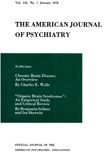Delusional and nondelusional unipolar depression: further evidence for distinct subtypes
Abstract
In a retrospective analysis, the course, symptoms, treatment response, and personality of 54 delusional and 66 nondelusional unipolar depressed patients were compared. The delusional patients had more guilt feelings and were more ruminative, agitated, and referential than the nondelusional patients. They had a poor response to a tricyclic antidepressant therapy but good treatment outcome with a tricyclic- antipsychotic combination or ECT. The form and content of prior episodes were remarkably similar to the index episode in both groups. The authors believe that these findings support the conception of unipolar delusional depression as a distinct subtype of depressive illness.
Access content
To read the fulltext, please use one of the options below to sign in or purchase access.- Personal login
- Institutional Login
- Sign in via OpenAthens
- Register for access
-
Please login/register if you wish to pair your device and check access availability.
Not a subscriber?
PsychiatryOnline subscription options offer access to the DSM-5 library, books, journals, CME, and patient resources. This all-in-one virtual library provides psychiatrists and mental health professionals with key resources for diagnosis, treatment, research, and professional development.
Need more help? PsychiatryOnline Customer Service may be reached by emailing [email protected] or by calling 800-368-5777 (in the U.S.) or 703-907-7322 (outside the U.S.).



